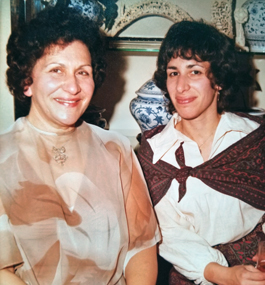Turning Points
Stray Hairs

Courtesy Susan Kraft Zemelman
Zemelman (right) and her mother, Eve, in a photo from the mid-1970s.
by Susan Kraft Zemelman ’65
My mother is obsessed with my eyebrows, along with other qualities of mine she has determined need working on.
In the middle of a phone conversation, she’ll begin talking about them: “They’re so nice and dark, but you need to shape them and do something about those thinning ends. Next time we’re together, I’ll tweeze them for you and fill out the ends with my eyebrow pencil.”
I don’t own an eyebrow pencil. Most of the time I say, “Fine,” knowing that when she visits she’ll forget and there will be better things to do than work on my eyebrows. But I do wonder why she cares so much about them.
When I ask her, the answer tends to be vague, something about wanting to make me even more perfect than I already am. I don’t buy it. My imperfections have long been a theme in our relationship.
But one day she started reminiscing about plucking her own mother’s eyebrows, as if eyebrow plucking is a secret bonding ritual among the women in our family. This answer made more sense to me.
My grandmother was not much into bonding. She was an efficient, take-charge mother but not a very affectionate one. Her skin gave off a coolness that let you know if you hugged her, you shouldn’t get too close. Kissing her was even more of a challenge. If I tried to do it, her face would turn at the last moment. I’d be kissing air, not skin. Then she would pull away entirely — find some phone to answer, some sauce to stir.
Occasionally, though, she would invite my mother to pluck her eyebrows. For this, she would sit very still, and her daughter could come close, very close, to see every stray hair that needed to be removed. My mother could touch her mother’s skin and look at the blueness of her eyes. My brown-eyed mother always wished she had inherited those eyes.
My mother would take the tweezers, place them on an errant hair and quickly pull. Sometimes my grandmother would give a little yelp, like a dog whose tail has been stepped on. My mother didn’t want to hurt her, but she couldn’t help it, could she? “Eve, that’s enough,” my grandmother would say impatiently, threatening to rise up and face her public with uneven eyebrows rather than endure one more moment of pain.
But she never got up. She just wanted my mother to know what she was putting her through. My mother worked slowly, making sure she didn’t miss a hair. She was expert at this.
When my mother was finished, my grandmother would look in the mirror and scrunch up her face, like she was not very happy with what she saw. But it was not the eyebrows. The eyebrows were fine — graceful and evenly shaped. Even my grandmother couldn’t deny that.
“Pencil them, Eve,” she would say in that oh-so-slightly imperious voice. And my mother would put her hand on my grandmother’s forehead to steady her face while she drew soft, wispy lines with the drugstore eyebrow pencil.
Now it’s my turn. “There,” my mother says. “Isn’t that an improvement?” She inspects her work with a self-satisfied sigh. I look in the mirror. My face has acquired a quizzical look.
“So sophisticated,” she continues. “What do you think?”
I touch my eyebrows. They feel soft and diminished. I wonder how long it will take the missing hairs to grow back. “I look different,” I say.
“You look great,” she says, ignoring the hesitation in my voice. “You should have let me do this a long time ago.”
She’s right, of course. I can imagine my grandmother appraising my eyebrows with squinted eyes. I hear her say, “A little more pencil on the left, Eve.”
Yes, I should have let her do this a long time ago.
Susan Kraft Zemelman is a part-time instructor in integrated marketing communications at Northwestern University.
